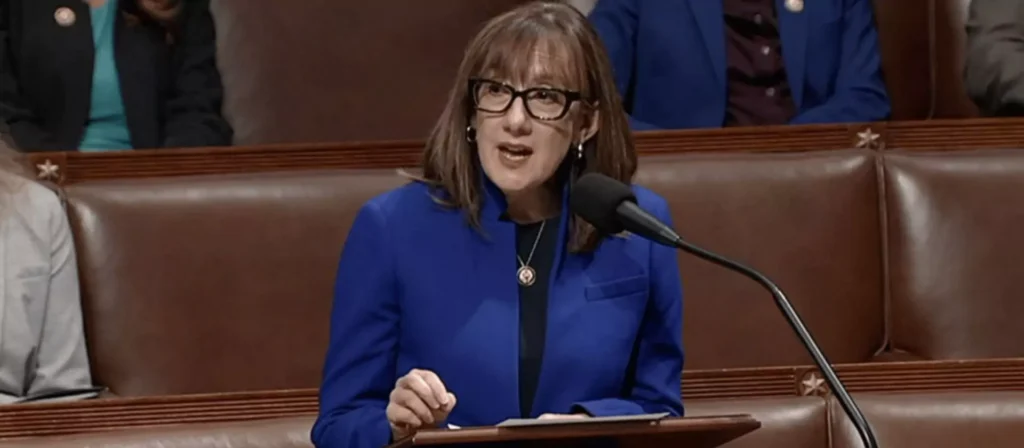Just ahead of the Memorial Day weekend, the U.S. House of Representatives passed a budget reconciliation bill – a massive tax and budget package. If this bill ultimately becomes law, it will – among other things – force deep cuts to safety net programs, especially Medicaid and nutrition assistance.
One of the members of Congress who voted no on the bill was Representative Andrea Salinas, who represents Oregon’s 6th Congressional District.
We spoke with Representative Salinas about what the budget reconciliation bill would mean for Oregonians and the people of this country.
Listen to prior episodes of the show
Transcript
We make this transcript available for your convenience and to increase the accessibility of our content. The transcript was generated by software and was slightly edited for clarity. If you are able to, we encourage you to listen to the recording.
Just ahead of the Memorial Day weekend, the U.S. House of Representatives passed the budget Reconciliation Bill, a massive tax and budget package. If this bill ultimately becomes law, it will, among other things, force deep cuts to safety net programs, especially Medicaid and nutrition assistance.
One of the members of Congress who voted “no” on the bill was Representative Andrea Salinas, who represents Oregon’s 6th Congressional District. My colleague Alejandro Queral, executive director of the Oregon Center for Public Policy, had a chance to speak with Representative Salinas about what the budget reconciliation bill would mean for Oregonians and the people of this country, and also what comes next. Here is their conversation.
Alejandro Queral: Well, thank you for being on Policy for the People, Congresswoman Salinas. It’s been a week since the U.S. House of Representatives passed by the narrowest possible margin, a budget reconciliation bill, a massive tax and budget package. You voted no on the bill. What’s your bottom line assessment of this legislation?
Representative Andrea Salinas: My bottom line is this is a terrible bill, not just for Oregonians, but for almost all Americans. First off, it’s a $4 trillion tax cut that mostly goes to very wealthy individuals at the expense of those who do not make very much. And we are adding to the deficit, putting that on the backs of our children. And we know that that deficit is harming our bond rating. Moody’s already downgraded our bond rating, which means it’s more expensive to borrow money. And this adds about $2 trillion every year to our tax debt. So it is a horrible bill.
But let me just tell you, what it does essentially is for families who earn about $50,000 or less, they would get just under $300 in tax cuts. Those who make over $1 million would receive an average $90,000 in tax breaks. But that $300 for the lower income, it would get eaten up by the elimination of health care benefits under Medicaid, as well as some of the SNAP nutrition benefits that these families may receive.
Alejandro: You sit in the House Agriculture Committee, which, among other things, has jurisdiction over the Supplemental Nutrition Assistance Program (SNAP), or what used to be called food stamps. So talk to us about the importance of the SNAP program and the changes that the reconciliation bill makes to snap.
Rep. Salinas: So the thing about the SNAP program and the nutrition programs is it really does help our working families to make ends meet. We know here in Oregon rent is very high. People are having a hard time sometimes making their mortgage payments. And they’re on the brink. They’re working two or three jobs. And so food assistance or SNAP, Supplemental Nutrition Assistance Program, helps these Americans. And these are folks who maybe are disabled, are older Americans, are children, are veterans. Those are people who maybe just work part time, maybe don’t have the ability to work full time. But they need to help make ends meet.
And we as Americans offer them $6 a day, $2 a meal to help them get food. And we are hearing right now from our food banks and our food pantries that the need for food right now is up by about 30% over what it was during the pandemic. But this bill is basically the largest cut in food assistance in American history.
We could likely see 800,000 Oregonians who depend on SNAP be harmed by this bill. And so I don’t understand how these Republicans are saying that it’s going to increase efficiency when you can’t work when you don’t get food. You can’t go to school when you don’t get food. And you are likely more sick when you don’t get food.
And so this is only going to harm our economy. It’s going to harm those who contribute to our society already. And it’s going to leave a lot of people out on the streets hungry.
Alejandro: One of the things that I think is really clear about the bill is that a lot of these cuts to the benefits and services are, not straight up cuts. They’re not directly taking money away, but rather, doing a number of what I would say are tactics to try to hide those cuts from public view. One of them, in the context of SNAP, is the idea of shifting the cost of the benefits to the states. In other words, that the states would be on the hook for paying what traditionally has been paid by the federal government. Oregon, it’s been estimated, would be on the hook for $1 billion in order to maintain the current level of service. So what does that cost shift mean to the state and more importantly, to Oregonians if the state is not able to meet that need?
Rep. Salinas: So this is exactly my point. And I think this is what you’re getting at as well, which is if the state can’t meet that nearly billion dollars to provide the nutrition assistance themselves – I don’t think they can, they’re not going to be able to afford that – what will happen is people will go without food.
And you’re right, they’re trying to hide it and veil it as, oh, we’re just making the states pay what they need to pay. And how they’re doing this is they’re saying, oh, the states have this error, right? And this is that efficiency that they’re talking about, right? Oh, we’re just trying to make them do what they’re supposed to do. And they need to be on the hook for abiding by the law. Well, Oregon does abide by the law. This error rate that is being talked about, Oregon actually makes overpayments. And so they pay more than they’re supposed to. But that’s still considered an error. And so the error that happens is they’re paying more than their fair share right now. But the federal government now is saying, that’s an error rate. So you need to be on the hook for this billion dollars in SNAP for people in Oregon who need this food assistance. And I call B.S. on it. It’s smoke and mirrors and it’s nothing more than a way to cut people off of food assistance.
Alejandro: You also mentioned that the choices that congressional Republicans are making and have incorporated into this bill would have an impact on the economy and certainly impact the Oregon economy. Agriculture is an important part of our economy in the state. How does the reconciliation bill affect farmers?
Rep. Salinas: You know, we talked a lot about this in the House Agriculture Committee, at least on the Democratic side, because our growers and our farmers actually sell to USDA The federal government is one of the largest purchasers of dairy products, of food directly from our farmers. And so to cut this program means to cut the ability of farmers to sell to the U.S. government. So that is not helpful to our growers across the nation. So this is a big part of it as well. And I think people don’t realize a lot of those nutrition programs go through the schools. Sometimes that is the only meal a child may get in a day is from their school. And whether it’s breakfast or lunch, it might be the only one or two meals that child gets. This will be harmed under this this bill.
So Democrats brought this up a lot. We brought so many amendments to basically fix this that would give our growers some additional avenues for more revenue and to give our kids additional meals. But nope. At every turn, we were shut down.
Alejandro: In addition to the cuts to food assistance, the reconciliation bill also makes big cuts to Medicaid, what is known in Oregon as the Oregon Health Plan. I know that when you were in the Oregon Legislature, you served as a chair of the House Health Care Committee. And so you know very well the progress we have made as a state to expand access to health care. So I wonder how you see the changes to Medicaid in the reconciliation bill. What do you anticipate could be the impact on Oregonians who are concerned about losing health care coverage?
Rep. Salinas: I think this is the piece that Republicans are running from right now, because a lot of Republican districts across the US have their constituents and their voters rely on Medicaid or, like you said, or what we call here the Oregon Health Plan.
So this bill will take away health care from about 13.7 million people, almost 14 million people across the US, and just 1.4 million here in Oregon. So this will be devastating. And as you know, Alejandro, this is almost a $1 trillion, almost $900 billion cut from the health care system. When you take that kind of money out of the healthcare system, we are going to see again a cost shift to others. Others who may pay premiums, who may have private insurance. Our premiums are going to go up, but it is definitely going to be a cost shift. And those who lose out are going to be those who have insurance and pay for it, and then those who no longer have insurance will have to seek care at the emergency room, where care is more expensive.
In fact, Congresswoman Bonamici and I just yesterday held a town hall to look at the effects of these cuts into Medicaid and what our mental health and behavioral health system will look like. And, you know, people have a lot of trauma right now. Oregon is one of the top states in terms of need for mental health access, whether it’s adolescent health, mental health care or for substance use disorder. And we are one of the states who has the least access to care. So we’re towards the bottom in terms of our access to care. And this bill will only exacerbate that problem and make it so much worse.
And I you know, I got a question from a reporter the other day and they said what would that ultimately mean? And I said, it will mean people will die. They will die deaths that are just too soon, too sudden, and they won’t be able to access the care they actually need.
Alejandro: The human impact is profound. And, you know, I wonder if you could talk a little bit about how the reconciliation bill goes after states that have, with their own money, paid for undocumented immigrants’ access to health care? I think this is a an area that has not been discussed enough, but could have a deep human impact to immigrant communities.
Rep. Salinas: Oh my gosh, it certainly will. So you know, it’s no secret, Alejandro, that I helped to pass the bill to expand access to health care for all people who live in Oregon. And it’s a good policy. And the reason it’s a good policy is because, as I just mentioned, the most expensive form of care is in the emergency room. So we don’t want people going there. It makes the whole system more expensive. And right now we’re seeing our emergency rooms overrun with those who do have substance use disorders, and maybe have addiction problems or mental health problems where the emergency room can’t care for them. But we want to avoid the emergency room.
And so we started off by basically allowing kids who may be undocumented get access to vaccines and to be in our school system and to make sure that they’re healthy and learning. And then we expanded it to all people. Well, the federal government is now threatening states, through the Affordable Care Act and basically saying, if you continue to fund with your own state dollars, we will take away Medicaid dollars from citizens, citizens of the state of Oregon and of the United States.
And that’s a hard place for the Oregon Legislature to be. And they’re going to have to make a hard decision, to figure out, do they continue to to cover all people or do they have to make a decision to help the people who could continue to be covered by the federal government under Medicaid?
Alejandro: You mentioned that you were holding some town halls during the recess. I’m curious about what you’re hearing from your constituents about this massive tax and budget package.
Rep. Salinas. So we’ve been holding town halls for a number of months since I was first sworn in January. And what we’re hearing is people are scared. They’re scared, and they’re afraid of what is going to happen for all the reasons I just mentioned. First of all, almost everyone across the United States either is on Medicaid or knows somebody, has a loved one, who’s on Medicaid or relies on the nutrition program. So people are very familiar with these programs, and they know how they help to bridge gaps in family budgets. And so people are afraid. They’re afraid of the cuts that they’re seeing in the Social Security Administration, not being able to get through. They’re afraid of what this bill is going to mean for Medicare. I don’t think this has been talked about enough either. It is actually going to restrict some of the funds through Medicare.
And so we need to make sure that this bill is changed before it gets out of the Senate. It’s going to be harmful on a lot of different levels. People, like I mentioned, they’re afraid, they’re unsure. And their lives feel very unpredictable right now.
Alejandro: Thank you, Congresswoman Salinas, we’re almost out of time, but I wonder if you have a parting message that you would like to leave to our listeners regarding the reconciliation bill and what comes next?
Rep. Salinas: Yes. I want to end the way you started. This was a narrowly passed bill on the House side. Two Republicans voted against it, and two didn’t even show up for the vote. And we need to change this bill in the Senate. We need to get it back on track, so it’s fairer on the tax cuts and restores some of the Medicaid, even some of the Medicaid. But I would love it if we restored all of the Medicaid and SNAP benefits. But right now as it exists, it just benefits billionaires and millionaires at the expense of some of our most vulnerable people across America and here in Oregon. And these are working families who, again, are trying to make ends meet.
So we can do it. Let’s keep pressure on the Senate. Let’s make sure they change it. And then we will have to deal with it when it comes back to the House. But I am optimistic and I’ve been talking to at least our Oregon senators on how that bill can be changed. So your listeners should probably call in and do the same.




